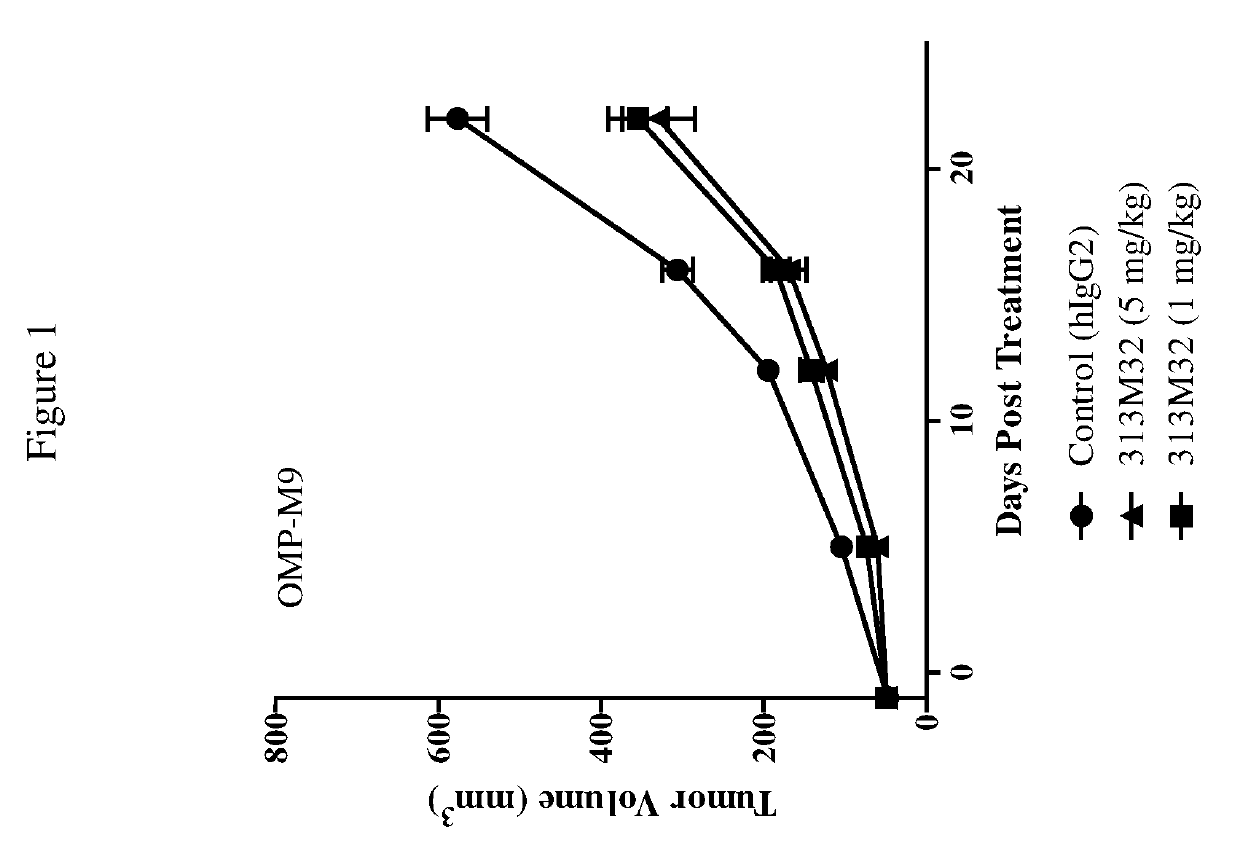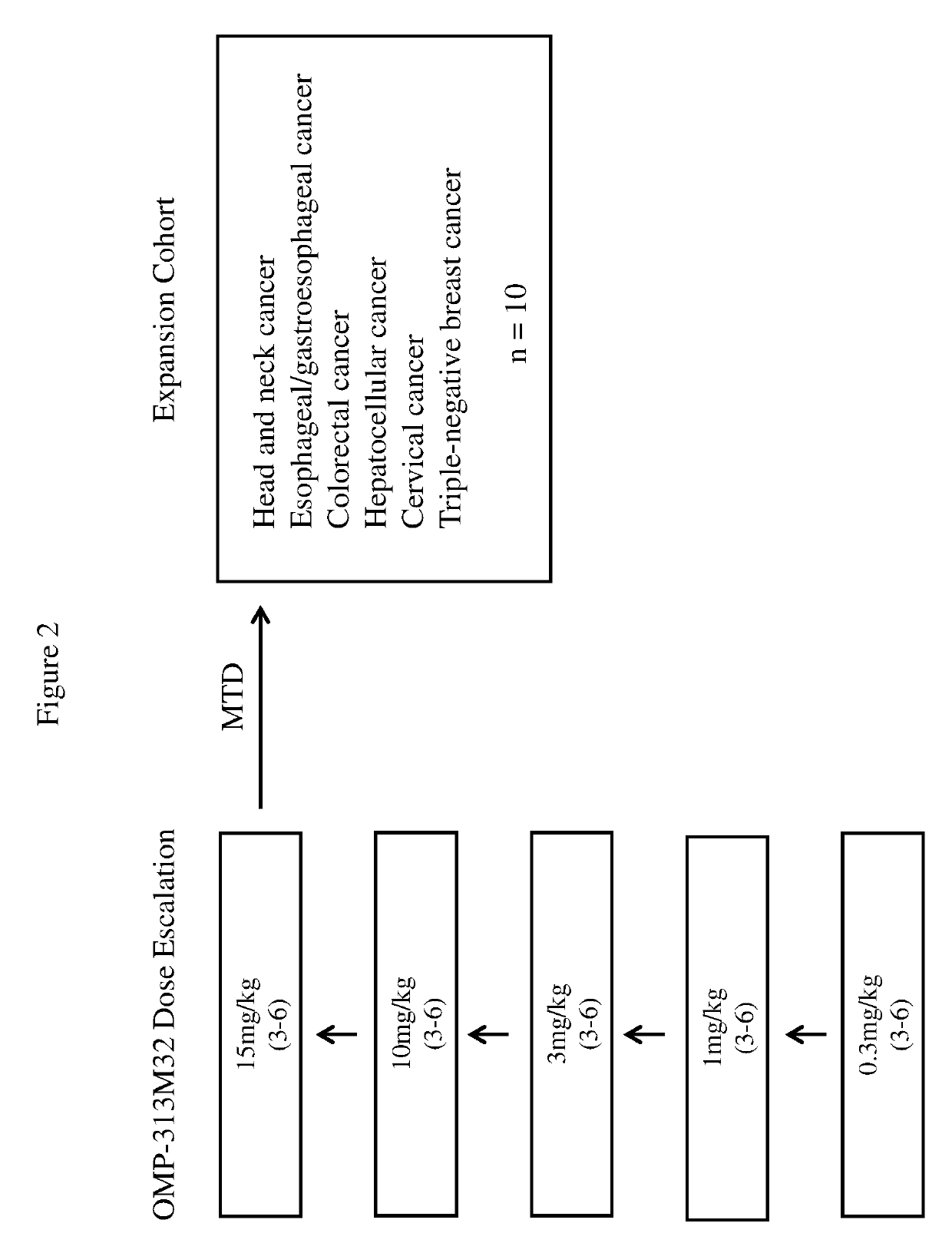Methods for treatment of cancer comprising tigit-binding agents
a technology of tigit and tigit, which is applied in the direction of antibody medical ingredients, drug compositions, peptide sources, etc., can solve the problems of complex and subtle control systems of cells' interactions and responses, and achieve the effects of inhibiting tumor growth, reducing tumor growth, and reducing tumor growth
- Summary
- Abstract
- Description
- Claims
- Application Information
AI Technical Summary
Benefits of technology
Problems solved by technology
Method used
Image
Examples
example 1
In Vivo Tumor Growth Inhibition in Humanized Mice by an Anti-TIGIT Antibody
[0300]A humanized mouse model was used to study the efficacy of treatment with an anti-hTIGIT antibody on a human tumor. The humanized mice were obtained from Jackson Laboratories. These mice were created by injecting human hematopoietic stem cells (CD34+ cells) into irradiated NSG mice. After 15 weeks, the presence of mature human lymphocytes was confirmed by flow cytometry. Each mouse was injected subcutaneously with patient-derived melanoma tumor cells (OMP-M9; 75.000 cells / mouse). Tumors were allowed to grow 19 days until they had reached an average volume of approximately 50 mm3. Tumor-bearing mice were randomized into groups (n=8 mice per group). Tumor-bearing mice were treated with either a control antibody or anti-hTIGIT antibody OMP-313M32. Mice were dosed every 5 days at 1 mg / kg or 5 mg / kg. Tumor growth was monitored and tumor volumes were measured with electronic calipers at the indicated time poin...
example 2
Phase 1 Study
[0302]An open-label Phase 1 dose escalation and expansion study of OMP-313M32 in patients with certain locally advanced or metastatic tumors was designed. Patients have tumors that have progressed after standard therapy or have tumors where therapy has proven to be intolerable or is considered inappropriate. Prior to enrollment, patients will undergo screening to determine study eligibility. The study objectives are to evaluate the safety and tolerability of OMP-313M32 in patients: to estimate the maximum tolerated dose (MTD) of OMP-313M32; to characterize the dose-limiting toxicities (DLTs) of OMP-313M32; to identify a recommended Phase 2 dose of OMP-313M32; to characterize the pharmacokinetics of OMP-313M32; to characterize the immunogenic potential of OMP-313M32; to make preliminary assessment of the anti-tumor activity of OMP-313M32; and to make a preliminary assessment of pharmacodynamics (PD) markers.
[0303]As shown in FIG. 2, dose escalation is performed to determ...
example 3
TIGIT Protein Expression Assessed by IHC
[0306]To investigate TIGIT protein expression, a TIGIT immunohistochemistry (IHC) assay was developed and optimized using a proprietary mouse anti-hTIGIT monoclonal antibody. Four-micron FFPE sections were cut and mounted onto positively-charged capillary gap slides. Tissues were dewaxed through four, 5-minute changes of xylene followed by a graded alcohol series to distilled water. Steam heat-induced epitope recovery (SHIER) was performed with SHIER 2 solution (citrate-based buffer pH 6.0-6.2) for 20 minutes in the upper chamber of a Black and Decker Steamer. Slides were pre-treated with proteinase K enzyme (1:40 dilution) for 10 minutes and were incubated in a blocking solution for 15 minutes to reduce non-specific background staining. Slides were incubated with the anti-hTIGIT antibody overnight at 1 g / ml. To block endogenous peroxidase activity slides were incubated in hydrogen peroxide 3 times for 2.5 minutes and washed in PBS. Specific b...
PUM
| Property | Measurement | Unit |
|---|---|---|
| Time | aaaaa | aaaaa |
| Time | aaaaa | aaaaa |
| Time | aaaaa | aaaaa |
Abstract
Description
Claims
Application Information
 Login to View More
Login to View More - R&D
- Intellectual Property
- Life Sciences
- Materials
- Tech Scout
- Unparalleled Data Quality
- Higher Quality Content
- 60% Fewer Hallucinations
Browse by: Latest US Patents, China's latest patents, Technical Efficacy Thesaurus, Application Domain, Technology Topic, Popular Technical Reports.
© 2025 PatSnap. All rights reserved.Legal|Privacy policy|Modern Slavery Act Transparency Statement|Sitemap|About US| Contact US: help@patsnap.com


